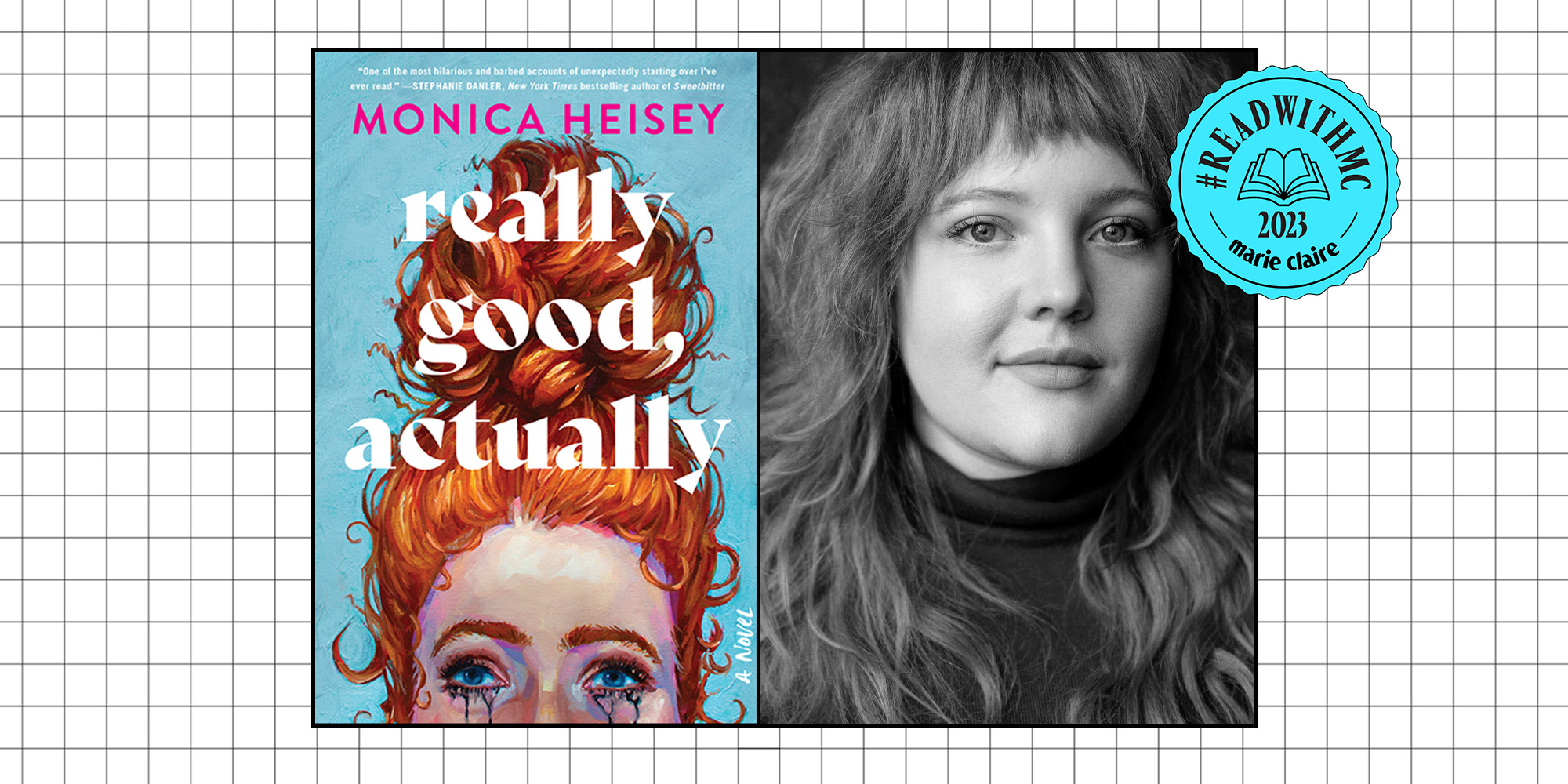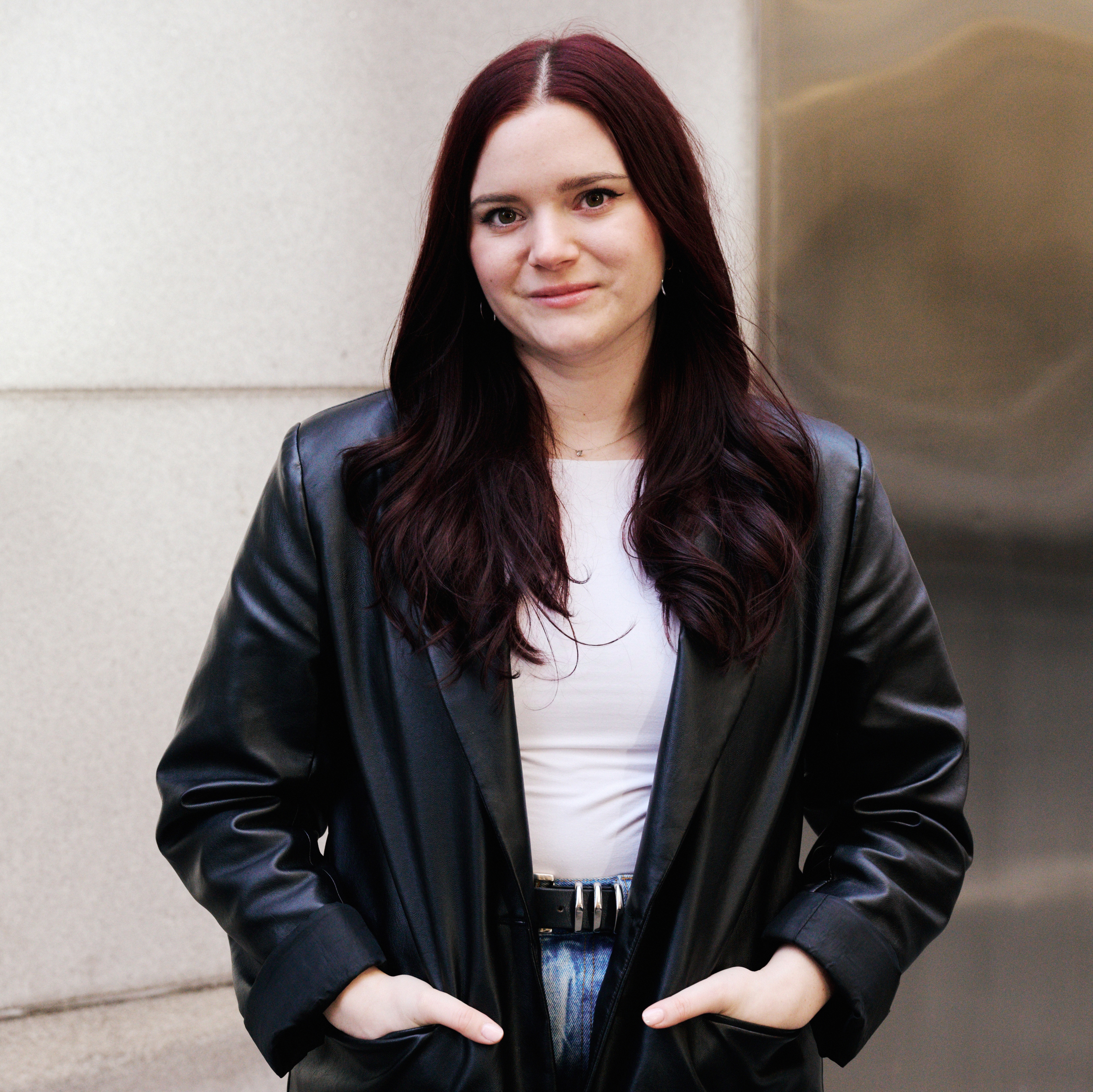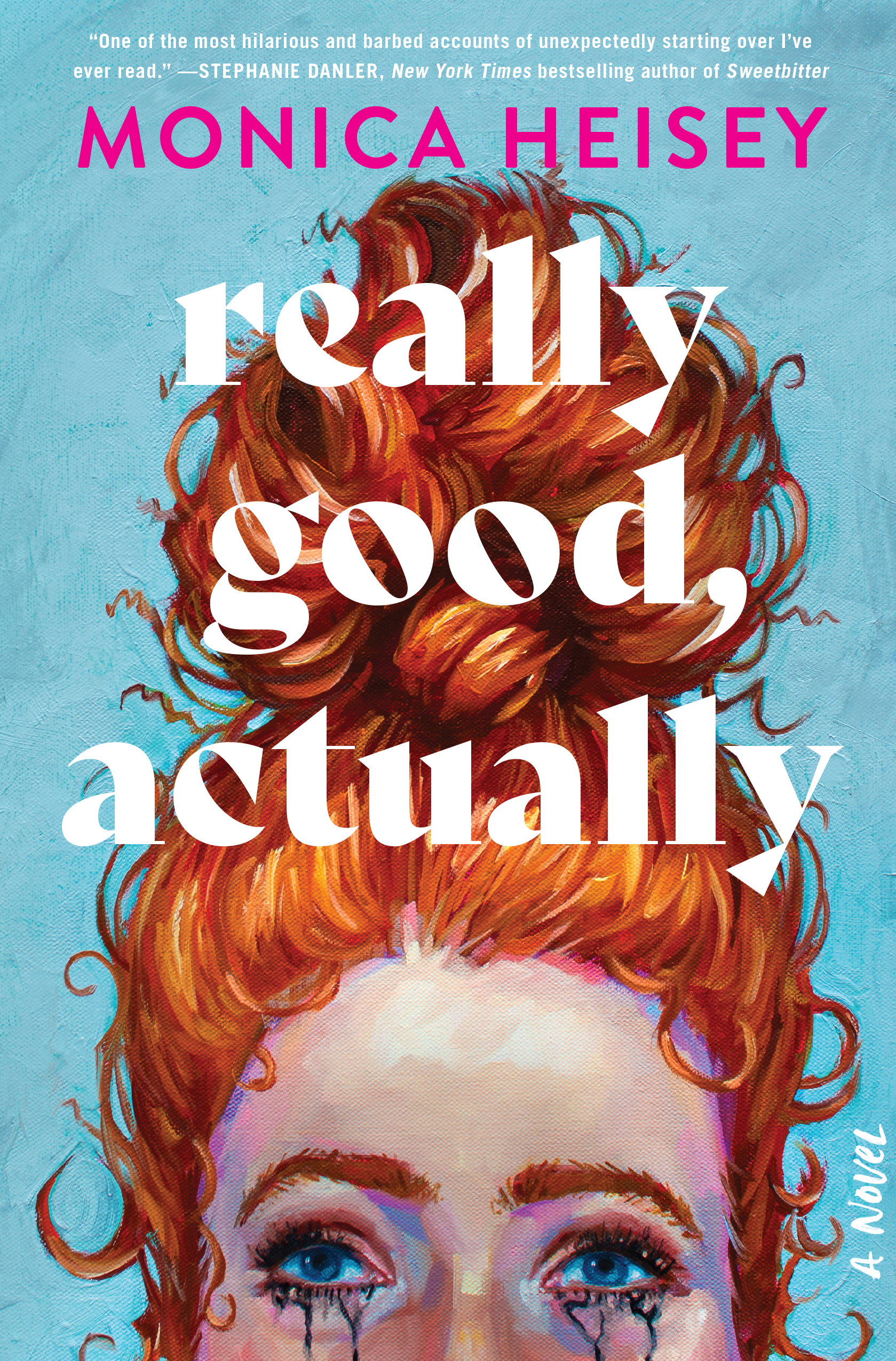'Really Good, Actually' Is Our February Book Club Pick
Read an excerpt from Monica Heisey's debut novel, here, then dive in with us throughout the month.


Welcome to #ReadWithMC—Marie Claire's virtual book club. It's nice to have you! In February, we're reading Monica Heisey's Really Good, Actually, a laugh-out-loud comedy about a surprisingly young divorcée learning to embrace her new single life. Read an excerpt from the book below, then find out how to participate. (You really don't have to leave your couch!)
That first month alone passed in a haze. A typical day involved waking up after one, then lying in bed joylessly masturbating while The Last Five Years soundtrack (original off-Broadway cast recording) played in the background. My afternoons consisted mostly of trying to work, then giving up and posting Instagram Stories containing oblique references to my emotional state. At some point in there, I turned twenty-nine.
It was this that had forced me to confess to my friends. As a group, we went hard for occasions, and a birthday should have been no exception. We had agreed months ago to celebrate with a trip to Toronto Island’s nude beach, bringing cake and cocktails and nothing else. The chat was deep in discussion about the importance of sunscreen and the merits of various private water taxis when I cracked. i need to postpone, I wrote, jon moved out . . . permanently i think? An unbearable few minutes of silence followed, then Clive wrote, be there in thirty.
I fell back on my bed and stared at a patch of water damage on the ceiling until I heard him bounding up the front steps. I got up, fixed my hair, and went to the door, and for a moment I did not want to let him in. He would see my bare apartment, the missing books on shelves, the piles of takeout for one. If I showed this to Clive, I would eventually have to show everyone else. I would have to walk around and be in the world, alone.
I screwed my courage near the sticking place and unlocked the door.
“Out of ten, how ready are you to joke about this?” he asked.
I mulled. “Six?”
Get exclusive access to fashion and beauty trends, hot-off-the-press celebrity news, and more.
“Right,” he said. “So we’ll get into the eyebrows another time.”
Clive and I had met in the university’s drama society in second year, and became close when we played each other’s love interests in what he termed a “chubs-only” production of The Music Man. He still occasionally yelled “MADAM LIBRARIAN!” and pulled me in for a wet kiss after a few too many drinks. We leaned against the kitchen table (I would need to buy some chairs) while I tinted my eyebrows with beard dye and Clive told me I’d be back to normal in no time.
“These things happen,” he said. “If you had committed to everything you wanted when you were nineteen, you’d still be wearing that little vest. And anyway, the happiest people on earth, statistically, are childless, unmarried women. You did it!” He clasped both my hands like our Little League team had just won the big game.
To be blasé about something like this was classically Clive. The only things he took seriously in life were cooking, his job as a producer of structured reality television, and his 2011 new year’s resolution to “become famous,” which he was still working on. Around the same time as the resolution (and potentially in service of it), he had asked us to start calling him Clive instead of Brandon, which was his given name, and although it took some getting used to, ultimately we agreed that stylish Brandons were thin on the ground, so the change was fair enough.
Clive and I split a bag of jagged low-calorie chips and toasted the beginning of my “ho phase,” though my lip started to quiver as our glasses clinked, forcing him to walk it back and remind me that every ho must take things at a pace that works for her. When his assistant texted that they were in danger of losing Scott Moir as a guest judge on a new show where hockey players were paired with professional ice dancers, Clive ran off, promising to check in on me tomorrow.
Amirah arrived an hour or so later, distracting me from my own circumstances with one of her classic workplace embroilments. Although she had been happily partnered for over a year, Amirah was constantly stoking emotional affairs with men at the hospital who then became obsessed with her. The latest of these poor fuckers was an orderly called Brian.
“It’s getting bad,” said Amirah, half sorry and half loving it. “Last week he made me a playlist. He keeps asking if I’ve listened to it, but to me, that is where I draw the line.”
“At listening to the playlist.”
“Yes,” she said gravely. “Who knows what could be on there?”
It was easy to understand how Amirah was wreaking romantic havoc on C-Wing. She was casually gorgeous, even in scrubs, and a little bit mean in a way men were obsessed with. When I moved into my dorm, she was already fully installed in her room across the hall, adjusting the angle of a Pussycat Dolls poster near the window. I’d said, “Do the non-Nicole ones even have names?” and she’d said, “Maybe they’re all called Nicole,” and that was it.
“How are your parents taking it?” she asked after we had scoped Brian’s track list (handwritten on heavy paper, highlighting relevant lyrics . . . oh, Brian). I told her they were following my lead, which meant we were not talking much. My mother had offered, instantly, to come down to Toronto and get me, to take me back to Kingston for as long as I needed and feed me all kinds of comfortingly nostalgic baked goods; but I stayed where I was. In a way it was a relief that my family—mom, dad, younger-but-wiser sister Hannah—was safely stowed a few hours out of town, the depth of their worry revealing itself only in my father’s daily text: alive? y/n.
Anyone trying to comfort me had been dealt an impossible task: too much attention and care felt like pity, not enough was proof that I was worthless and no one wanted to be around me. I told Amirah my ideal situation (to the extent that any of this could be considered ideal) would be for everyone to know about the divorce without my having to tell them, and for me to lie in some kind of hyperbaric de-stressing chamber until I was ready to reenter society. I needed a few weeks to be disgusting on my own and adjust to my new life as an unlovable husk. Amirah curled her long legs underneath herself, and I could tell she was going to say something annoying.
“Do you want my mom’s therapist’s number?”
I did not. It was only a divorce, and not a particularly juicy one. I hadn’t even had any significant dreams—what would we talk about?
“I don’t think I’m very ‘therapy’ in general,” I said. “Doesn’t seem like a fit.”
I meant it. The only therapist I’d ever met was Jon’s cousin Penelope, a small woman with lank blond dreadlocks who ran workshops where participants dug their own graves and were buried in them so they might experience ego death.
“I don’t think this would be . . . like that,” Amirah said. She held a finger to her lips and bit the corner of a hangnail, looking at me pensively while she ripped it off with her teeth. “But it feels like, if there was ever time for a li’l soupçon of therapy, this would be it, right?”
“I’m good,” I promised. “I downloaded this meditation app thing, and I’m gonna do more running . . .Hey, does Tom know about Brian?”
Anyone trying to comfort me had been dealt an impossible task: too much attention and care felt like pity, not enough was proof that I was worthless and no one wanted to be around me.
Tom was Amirah’s lumbering boyfriend, a man with enormous hands and a booming laugh, who had some important, hip job at a downtown brewery. They had met on a dating app last spring and been inseparable ever since. Their love language seemed to be tagging each other in flattering photos captioned with long descriptions of their friendship and the way life together felt like an adventure. Their favorite adventure was going to restaurants. First Tom would post Amirah holding a crisp glass of white—fridays with this one—then when mains arrived, Amirah would post Tom—big boy loves a slice—after which Tom would repost her photo of him, with Amirah finally closing the circuit by sharing the original “fridays” post to her Story. In this way, everyone they knew got to see every side of the table at which they had eaten. This behavior was very, very unlike Amirah, but love makes people corny and a bit absurd, and that is just how it is.
I was curious how she felt the embroilments fit into the photoshoots, the oyster nights, the big boy himself.
“I’m not doing anything with these guys,” said Amirah. “And Tom’s only a boyfriend, so far.”
I had forgotten about Amirah’s unorthodox definition of the word, which she felt implied no real commitment outside time spent together. Amirah was always ruthlessly casual until the instant she decided a man was the One. There had been two Ones so far—a high school boyfriend and a med student who still texted sometimes—but Tom seemed due a promotion.
“Anyway,” said Amirah. “One is real life, and one is, like, a frisson. I know what I want long term, but sometimes in the moment you really need to know someone has never seen anything better than your ass.”
That did sound nice. Maybe I could have a frisson or two, even if my long-term trajectory was irreversibly “husk.” Amirah received a text asking her to cover for someone at work. “Do you mind if I go?” she asked. “I’m trying to build up goodwill so I don’t have to work New Year’s. Plus there’s a patient I promised I’d make friendship bracelets with.”
“Should I be jealous?” I asked.
“Well, she’s a seven-year-old with bone cancer, so probably not,” said Amirah.
I sucked the insides of my cheeks between my teeth. “Fuuuuuck!” I said. “Fuck. I meant, like—”
“I know what you meant,” she laughed. “And this patient’s prognosis is pretty good. Chill out.”
I was always amazed at how lightly Amirah wore the day-today heaviness of her work, how she could go into the hospital and deliver difficult news to parents or help children manage pain they would be dealing with for their entire lives, then come to dinner and listen to the rest of us complain about bad email etiquette. Whenever she revealed some harrowing detail about the hospital the rest of us would panic, though as she’d pointed out many times it was not a competition, and Clive’s professional stress was not less valid just because it was mostly caused by the tumultuous personal lives of minor Canadian sports personalities. (“Are we . . . sure about that?” Clive had asked at the time. I still was not.)
“God, that’s so intense,” I said. “I don’t know how you aren’t constantly having a breakdown.”
“There is actually a crying room on the third floor,” said Amirah. “But it’s mostly nice to be able to be there for people going through a hard time. Like it’s difficult, but it’s good. I’m sure that’s how you feel when you . . . explain Macbeth, or . . . Honestly, I have no idea what your job entails.”
“Like half of it is coming up with puns for the pre-colon part of paper titles,” I said. “But in many ways that is similar to helping children with cancer, you’re right.” I stood and started rummaging through my cupboards. “Let me feed you before you go.”
I took out ingredients for her favorite sandwich, a disturbing combination of pickles and hummus with honey and ballpark mustard. Amirah stood behind me as I assembled it, swiping her index finger into open jars before closing them and putting them back in the fridge.
“Why don’t you text the Laurens,” she said, taking a first, soggy bite. “Don’t sit around your apartment alone. It sucks in here without Janet.”
To avoid crying at the mention of my cat, I shouted, “GREAT IDEA” with unconvincing vigor and pulled out my phone. It turned out the Laurens were convening shortly at a bar near Emotional Lauren’s office that offered wine by the ounce. I told Amirah I did not feel particularly sociable but did want to drink several thousand ounces of wine.
“Perfect!” she said. “You can walk me to work.”
She grabbed her bag and we headed to the hallway, where I tried to make myself presentable with a stray mascara I’d left on the shelf near my keys. I poked at the bags under my eyes and sighed loudly.
“Shame this had to happen right as I lost my last shred of youthful beauty,” I said.
“Don’t talk that way,” said Amirah, pulling on a pair of decorated plastic clogs. “Ugh, I could kill Jon. I’m so mad at him.”
“It’s not his fault,” I said, shoving my keys into a purse and opening the door. “Really. It’s my fault, if anything.”
Amirah made a face. “How is it your fault?”
I didn’t really know, that was just how it felt.

Brooke Knappenberger is the Associate Commerce Editor at Marie Claire, where she specializes in crafting shopping stories—from sales content to buying guides that span every vertical on the site. She also oversees holiday coverage with an emphasis on gifting guides as well as Power Pick, our monthly column on the items that power the lives of MC’s editors. She also tackled shopping content as Marie Claire's Editorial Fellow prior to her role as Associate Commerce Editor.
She has over three years of experience writing on fashion, beauty, and entertainment and her work has appeared on Looper, NickiSwift, The Sun US, and Vox Magazine of Columbia, Missouri. Brooke obtained her Bachelor's Degree in Journalism from the University of Missouri’s School of Journalism with an emphasis on Magazine Editing and has a minor in Textile and Apparel Management.
